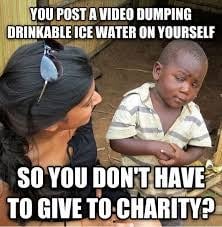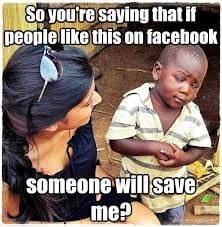The fraught politics of how the West views Africa—captured in a photograph
It is a simple image. A young woman is seemingly trying to chat to a boy. The boy’s face registers a puzzled look and he recoils slightly from the woman. His reaction is kind of funny. And when the photo got posted on Reddit three years ago, it immediately went viral, inspiring countless memes.

It is a simple image. A young woman is seemingly trying to chat to a boy. The boy’s face registers a puzzled look and he recoils slightly from the woman. His reaction is kind of funny. And when the photo got posted on Reddit three years ago, it immediately went viral, inspiring countless memes.




The original story behind the photo is that the young woman in the photo met the boy in a market in Uganda. She was there working on an aid project that helps women affected by the conflict precipitated by the Lord’s Resistance Army.
“I was with a group of other medical students at the time, we were walking around and I saw this little boy, he seemed really sweet,” Heena Pranav, who is now a doctor and lives in Chicago, told the BBC. “His mom was nearby working in the market. I went up to him to play with him and say ‘hi’… he was the most animated child I’ve ever met.” Her friend took the photo and, to borrow a phrase, the rest is internet history.
The image has raised a ton of questions, primarily over the manner in which some Westerners that live and work in Africa engage with the continent and its people. To begin with there is the issue of privacy. In Britain, for example, taking photos of children has become such a fraught issue that a school a few years ago banned parents from photographing the nativity play.
But there appears to be no such qualms when it comes to African kids. The person who took the photo did so without asking permission. Not only that but then it was posted on Reddit, imploring the platform’s users to “make this skeptical kid into a meme, STAT!” As another Reddit user pointed out, “does your friend have kids? Would she mind if I posed with them out of the blue some time and had my picture taken with them?” Pranav herself expressed some misgiving about what the image has inspired. She told the BBC, ”I wished the kid and his mom could have known about it and somehow benefited from it, because I do think he was exploited in the process.”
Then there is the question of the optics the image conveys. Once again the viewer is presented with the dichotomy of a foreigner in Africa dressed in cool sunglasses and a nice dress while the people she sees are poor wearing raggedy clothes. It perpetuates dominant narratives of the continent being full of impoverished people in need of saving by foreigners. In June, such imagery provoked a Twitter campaign #TheAfricaTheMediaNeverShowsYou to try and presenting a counter narrative.
But then again, are we over-thinking this? Why do we have to politicize a simple photo? Couldn’t this be one of those times that a photographer and reality come together to capture a human moment that is just funny? Regardless, the polarizing nature of the reaction once again reveals the treacherous politics of international development. The power dynamic in this area is still very much stacked against Africa. In this context misunderstandings such as the one inspired by the “Skeptical Third World Child” are inevitable.